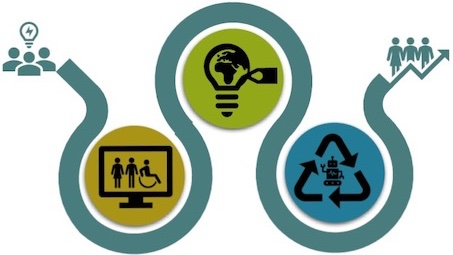Kickoff Metting INNALP Education Hub

Official Start of our FFG Project INNALP Education Hub
Published on October 10, 2021 by INNALP Education Hub
ffg stair-lab
Objectives
The INNALP Education Hub uses regional synergies and creates an infrastructure offer which bundles resources, facilitates the development of innovation projects, enables systematic testing of educational innovations with students and offers cost-effective scientific evaluation of educational innovation projects. Education, research and business partners, together with three education directorates and six partner schools form an innovation network. Teachers and students test innovative teaching & learning methods and try out the use of (digital) technologies. Future teachers learn about innovative educational concepts during their training and carry these innovations into their professional field.
Content
The content-related and interdisciplinary network of innovation activities is based on the guiding criteria of optimized use of analog/digital/combined concepts and materials, as well as inclusion and sustainability in the three innovation spaces. The DigiTech Space offers laboratory infrastructure for educational innovations that focus on digitization and robotics in vocational training and in technical-creative teaching. The Media, Inclusion & AI Space addresses inclusion, assisting technologies and AI, as well as media and technology culture. Green Space innovations are implemented in non-formal learning settings and address Education for Sustainable Development.
Methods
Innovation projects address educationally relevant development questions, such as “How can 3D printing be used for sustainable learning by means of learning-by-design?”. Evaluation is selected on the basis of the task or the innovation objective. For the implementation they are registered with the INNALP project management, which books time slots for testing in the innovation labs equipped for this purpose. Students of the selected target group are invited to the tests and accompanied scientifically. A technical lab supervisor is on site. New projects are planned and investments are agreed upon in the internal advisory board.
Results
Professional expertise, practical guidance and state-of-the-art infrastructure are offered in six lab locations. 19 new educational concepts are developed and tested with teachers and a total of 1520 students. As part of the quality management, 19 theses will be written by student teachers/doctoral students and 19 innovative teaching and learning offers will be integrated into the region’s educational offers. The project management ensures the effective, low-threshold and sustainable use of shared resources. Over three funded project years, an INNALP innovation culture is established. The established laboratories guarantee a further promotion of this changed understanding of the educational context beyond the project duration. Due to its organizational and content-related orientation, the INNALP Education Hub will make significant contributions to the national digitization initiative and the SDG sustainability goals.